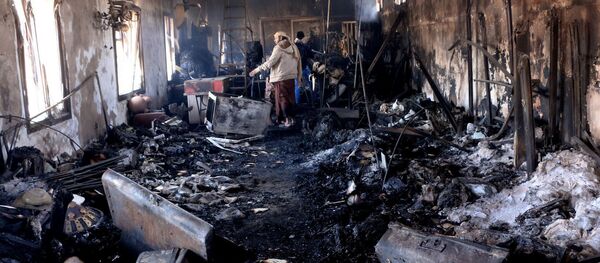Rep. Ro Khanna (D-CA), author of H.J. Resolution 37, which passed in the House Wednesday, said the bill invokes the War Powers Resolution of 1973 to end unconstitutional US participation in Riyadh's war in Yemen. The 1973 resolution checks the president's power to commit US forces to war, requiring Congressional authorization for any long-term commitment — as does the US constitution. The resolution, however, is routinely ignored.
The Senate passed a very similar measure — S.J. Resolution 54 — last December, Sputnik reported, but the bill was barred from being voted on in the Republican-controlled House. Lawmakers' frustration boiled over then, and the resolution was brought up for a vote in the lower chamber, now majority-Democrat, Wednesday, said Rep. Nancy Pelosi (D-CA), the Speaker of the House.
"The Yemen resolution is coming up now because there was real disappointment at the end of the last Congress," Pelosi said Wednesday. The way in which the Yemen resolution was killed was "highly unusual," the congresswoman said.
"Republicans put forth a rule that eliminated the possibility of bringing it to the floor," Pelosi noted.
Republicans who did not want to publicly denounce the resolution but to quietly neutralize it pulled off a stunt to prevent their colleagues from voting. Specifically, the House Rules Committee established a rule during debate about a farm bill that said resolutions about war powers no longer possessed "privileged" status, The Hill reported, adding that a bill's "privileged" status empowers lawmakers to force a vote.
The war in Yemen between the Saudi Arabian-led coalition started in 2015 during then-US President Barack Obama's second term. If you do not recall a storm of national debate in the US about whether it was just, proper or logical for US military assets to be used against the Houthi rebel uprising, that might be because one never really took place.
Indeed, in late 2018, some Democrats acted as if they'd been asked to prove a novel theorem in quantum mechanics when faced with questions about Yemen. "I don't know a damn thing about it," Rep. Collin Peterson (D-MN) told the Washington Post in December when asked for his thoughts on the war in Yemen.
Peterson voted in favor of the no-voting-on-Yemen rule proposed by the House Rules Committee last year. In Peterson's view, "all it did was say they couldn't have a vote or something. Didn't authorize anything, it didn't — you know. Our party gets off on tangents. It's ridiculous."
These tangents have allowed the US to continue to support the Saudi coalition, fueling their fighter jets to top up their fuel tanks — perhaps before firing a US-made bomb on a school bus of children — training their pilots and so on.
Despite Congress's past failures with its war-making responsibility, there are reasons to stay hopeful.
"I was encouraged also to hear yesterday that the Democratic chair of the Foreign Affairs Committee in the House said that if there was going to be any military intervention against Venezuela, it would have to come from the House of Representatives — it would have to come from the Congress," Condon told Radio Sputnik's Loud & Clear.



